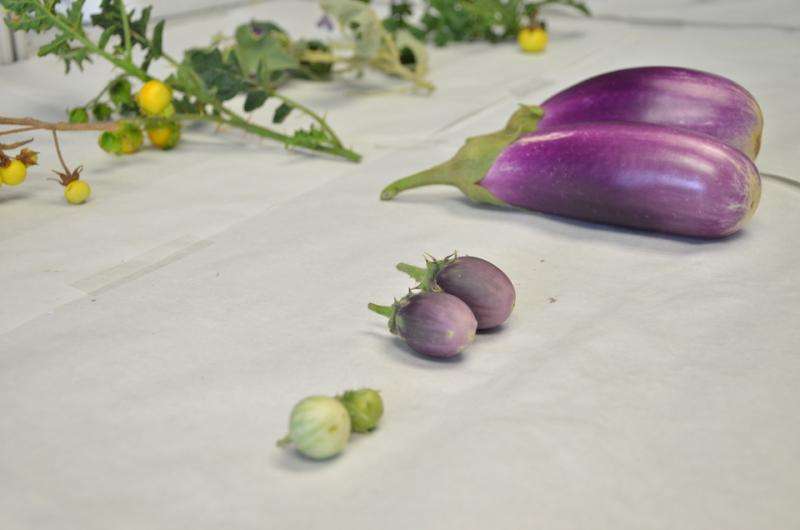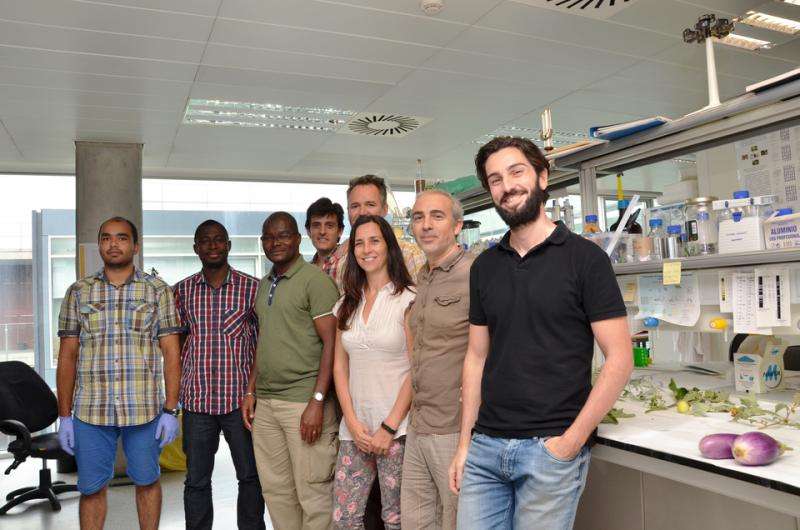International project to create climate change-resistant eggplants

Researchers from the Polytechnic University of Valencia (UPV) are at the helm of an international project to create eggplant varieties that are resistant to climate change, extreme temperature conditions and drought, as well as certain diseases.
The project is known as EggPrebreed and is coordinated by the UPV's University Institute for Conservation and Improvement of Valencian Agrodiversity (COMAV). Experts from the University of Peradeniya (Sri Lanka) and Félix Houphouët-Boigny University (Ivory Coast) are also taking part. EggPrebreed is part of the global initiative "Adapting Agriculture to Climate Change: Collecting, Protecting and Preparing Crop Wild Relatives", managed by the Global Crop Diversity Trust with the Millennium Seed Bank of the Royal Botanic Gardens (Kew, UK) and supported by the Norwegian government.
Eggplant is one of the most important vegetable crops in the world, particularly in tropical and subtropical regions. It is classified as one of the 35 most important for food security, and is listed in Annex 1 of the International Treaty on Plant Genetic Resources for Food and Agriculture.
The project focuses primarily on the adaptation of this crop to climate change in countries in Southeast Asia and West Africa, regions that are particularly vulnerable to climate change and where the eggplant is a staple crop. At the UPV's COMAV institute, wild species are being crossed with local varieties in a strategic, pre-breeding phase prior to the development of new varieties.

To date some 58 different hybrids have been obtained by crossing native eggplant varieties with different wild relatives from Africa, the Middle East, Southeast Asia and America that are able to grow in extreme conditions: daytime temperatures of over 35 degrees and night-time temperatures of below zero, in desert regions, for instance. Among the wild species the researchers are working with are Solanum incanum and Solanum torvum.
"It is precisely because of this tolerance to abiotic and biotic stresses that wild species are used as the base for crosses and to obtain new eggplant rootstocks. They are crossed with varieties from Sri Lanka and Ivory Coast, and the resulting hybrids are then back-crossed with these same cultivated varieties, introducing only the genes and characteristics we are interested in keeping," comments Jaime Prohens, director of COMAV at the Polytechnic University of Valencia.
These results are particularly useful for those working on genetically improving our crops; they are a first step towards obtaining new climate change-resistant varieties, "which might take between five and ten years" to achieve in the context of countries in Southeast Asia, like Sri Lanka, and in West Africa, like Ivory Coast.
The project also develops introgression lines (ILs), which are a powerful pre-breeding tool that allows eggplant breeders to have the entire genome of a wild relative scattered across a set of lines with the genetic background of the cultivated eggplant. These introgression lines reduce the time needed to develop varieties with desirable traits from wild species.
Sharing the knowledge
An important element of this project is the exchange of knowledge and specialization between the different participating groups. To this end, several researchers from Sri Lanka and Ivory Coast have spent time working at the UPV, enabling fruitful collaboration between experts in different fields.
The EggPrebreed team, led by the UPV, presented the results achieved to date at the international SOL 2015, the 12th Solanaceae Conference, held in Bordeaux (France) last October.
Provided by Asociacion RUVID


















